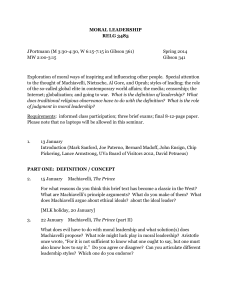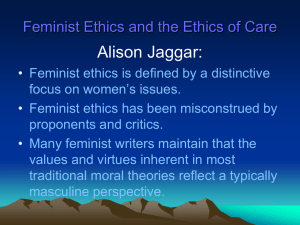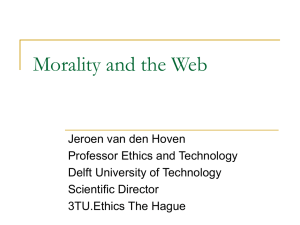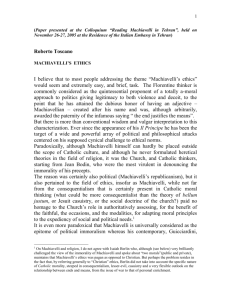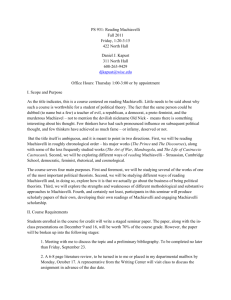Moral Leadership 2015
advertisement
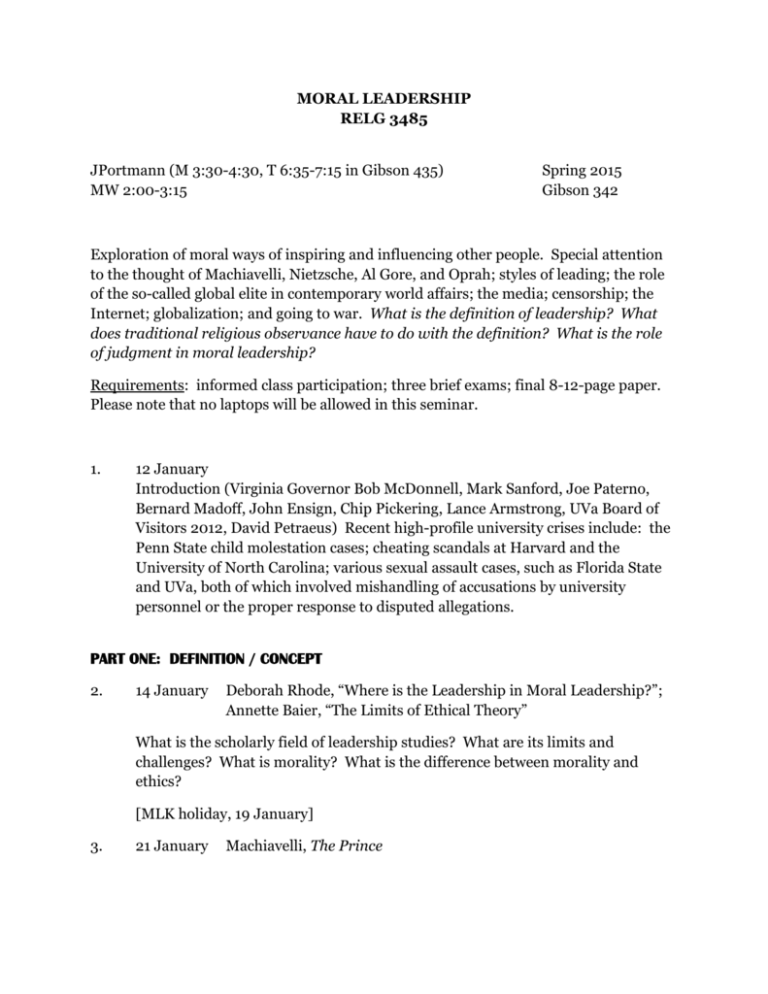
MORAL LEADERSHIP
RELG 3485
JPortmann (M 3:30-4:30, T 6:35-7:15 in Gibson 435)
MW 2:00-3:15
Spring 2015
Gibson 342
Exploration of moral ways of inspiring and influencing other people. Special attention
to the thought of Machiavelli, Nietzsche, Al Gore, and Oprah; styles of leading; the role
of the so-called global elite in contemporary world affairs; the media; censorship; the
Internet; globalization; and going to war. What is the definition of leadership? What
does traditional religious observance have to do with the definition? What is the role
of judgment in moral leadership?
Requirements: informed class participation; three brief exams; final 8-12-page paper.
Please note that no laptops will be allowed in this seminar.
1.
12 January
Introduction (Virginia Governor Bob McD0nnell, Mark Sanford, Joe Paterno,
Bernard Madoff, John Ensign, Chip Pickering, Lance Armstrong, UVa Board of
Visitors 2012, David Petraeus) Recent high-profile university crises include: the
Penn State child molestation cases; cheating scandals at Harvard and the
University of North Carolina; various sexual assault cases, such as Florida State
and UVa, both of which involved mishandling of accusations by university
personnel or the proper response to disputed allegations.
PART ONE: DEFINITION / CONCEPT
2.
14 January
Deborah Rhode, “Where is the Leadership in Moral Leadership?”;
Annette Baier, “The Limits of Ethical Theory”
What is the scholarly field of leadership studies? What are its limits and
challenges? What is morality? What is the difference between morality and
ethics?
[MLK holiday, 19 January]
3.
21 January
Machiavelli, The Prince
For what reason(s) do you think this brief text has become a classic in the West?
What are Machiavelli’s principle arguments? What do you make of them? What
does Machiavelli argue about ethical ideals? about the ideal leader?
4.
26 January
Machiavelli, The Prince (part II)
What does evil have to do with moral leadership and what solution(s) does
Machiavelli propose? What role might luck play in moral leadership? Aristotle
once wrote, “For it is not sufficient to know what one ought to say, but one must
also know how to say it.” Do you agree or disagree? Can you articulate different
leadership styles? Which one do you endorse?
5.
28 January
Nietzsche, On the Genealogy of Morals (first half)
How does this text and its advice differ from or conform to The Prince? How
does Nietzsche deconstruct the very notion of moral leadership? What hope does
he leave us with?
6.
2 February
Nietzsche, On the Genealogy of Morals (second half)
How is it possible to speak of moral leadership after Nietzsche? What does
Nietzsche mean by the idea of making your life a work of art? What does beauty
have to do with morality?
7.
4 February
David Rothkopf, from Superclass: The Global Power Elite and the
World They Are Making; Frank, “Aristokids” from Richistan
What do wealth and power have to do with moral leadership? (pp. 3-50, 77-110)
8, 9 4 February MAKE-UP CLASS, 5:00-7:30pm, Clemons 407
John Patrick Shanley, Doubt
If you cannot make this session, simply submit to me a 5-8pp. critical response to the
film –putting it in the context of our readings-- by 5:00pm on 17 February.
10.
9 February West, from Billionaires (pp. 113-144); Stiglitz, “America’s 1 Percent”
[first reading exam]
THE LEADER HIM/HERSELF
11.
11 February Lee Siegel, “Thank You for Sharing: The Genius of Oprah”
How does Oprah measure up as a moral leader? How well has she used her
considerable power?
12.
16 February Gus Van Sant, Milk (2009) {video on reserve in RMC}
WOMEN IN LEADERSHIP
13.
18 February Anne-Marie Slaughter, “Why Women Still Can’t Have it All”
PART II:
JUDGMENT
HOW TO HELP DEPRESSED PEOPLE
14.
23 February Patricia Marx, “Pets Allowed,” from The New Yorker
ENVIRONMENTAL DISASTER
15.
25 February Garrett Hardin, “Living on a Lifeboat”; and
Naomi Zack, from Ethics for Disaster
Disaster ethics tend to focus on 1) consent; 2) compensation; and 3) due process.
Why are they important?
xx
2 March
NO CLASS (made up in February)
xx
4 March
NO CLASS (made up in February)
>>SPRING BREAK 7-15 MARCH 2015<<
SEX SCANDALS
16.
16 March
Angus MacLaren, Sexual Blackmail
Sex undoes many moral leaders. What can leaders learn from studying
downfalls? Does a nation have a right to meddle in a leader’s private life?
17.
18 March
Sexual Blackmail (part II)
GLOBALIZATION
18.
23 March
Peter Singer, from The Ethics of Globalization; Al Gore, The Future
19.
25 March
Al Gore, The Future (part II); Thomas Piketty, from Capital
PRIVACY
20.
30 March
Vanity Fair, “The Snowden Saga” (Google this, May 2014)
ENVY OF THE LEADER
21.
1 April
Shakespeare, Coriolanus (video on reserve in RMC)
How can you lead people who envy you and want to see you fail? How can you
lead people you yourself do not respect? [second reading exam]
SOCIAL MEDIA
22.
6 April
Danah Boyd, It’s Complicated: The Social Lives of Networked
Teens
Today’s leaders must understand social networks. How can social networks work
for and against you? What does privacy have to do with moral leadership?
23.
8 April
Danah Boyd (part II)
13 April
Karl Marlantes, What It is Like to Go to War
WAR
24.
Machiavelli avers that the most important decision a leader ever makes is
whether to go to war. What makes war so important?
25.
15 April
Marlantes, What It is Like to Go to War (part II)
PLAGIARISM
26.
20 April
Richard Posner, The Little Book of Plagiarism
Plagiarism has undermined and humiliated a number of moral leaders. What is
this sin? How and why does it happen?
>>>>PAPER WORKSHOP
27.
22 April
Paper Workshop I
28.
27 April
third reading exam / Paper Workshop II
-=-=-=-=-=-=-=-=-=-=-=-=-=-=-=-=-=-=-=-=-=-=-=-=-=-=-=-=-=-=-=-=-=-=-=-=-=GRADING: Naturally, attendance in seminar is mandatory. Three or more absences
will result in the automatic lowering of your course grade (which is not to say that a
single absence makes no difference to it).
class participation
20%
3 reading exams (each at 10%)
30
final paper (8-12 pp.)
50
The final paper will be due at 5:00pm on 5 May as an email attachment to me
(Portmann@virginia.edu). I will deduct ½ a mark for every day it is late (beginning at
5:01pm on 5 May). You must choose your own final paper topic; you are expected to
demonstrate intellectual independence here. You may choose to focus on one particular
topic (and delve more deeply into the book from which the reading was taken) or to link
together two or more themes explored in the seminar.
If you would like to receive my comments on your final paper (not a draft of your paper
but the final paper itself), you must submit it to me by noon on 1 May.
No one will be allowed to make up a reading exam without pledging a statement
referencing medical care from a physician.
The only class participation that counts toward your grade is that which occurs in
seminar and over the class listserv. The Garrett Hall “Take a Professor to Lunch”
program, laudable as it is, does not count. Nor does speaking to me after class or in my
office count toward class participation. A “chip shot” in seminar will not help you (a
“chip shot” sounds like, “I really liked this article” or “I agree with what she just said”).
If you feel uncomfortable speaking in front of your peers, this seminar is not for you.
ADDITIONAL READING
Andrew Carnegie, The Gospel of Wealth
Robert Coles, Stories about Moral Leadership
Deborah Rhode, Moral Leadership: The Theory and Practice of Power, Judgment, and
Policy
Erasmus, Christian Prince;
John F. Kennedy, Profiles in Courage
Kenji Yoshimo, Covering: The Hidden Assault on Our Civil Rights
Marissa Mayer, The Charisma Myth
John Mueller, Atomic Obsession
C. Wright Mills, The Power Elite
Maurizio Viroli, Machiavelli’s God
Erica Benner, Machiavelli’s Ethics
Jim Collins, From Good to Great
Christopher Hood, The Blame Game: Spin, Bureaucracy, and Self-Preservation
Jonathan Ladd, Why Americans Hate the News Media and How it Matters
Patricia Churchland, Braintrust: What Neuroscience Tells Us about Morality
Lotte Asvold and Sabine Roeser, The Ethics of Technological Risk
